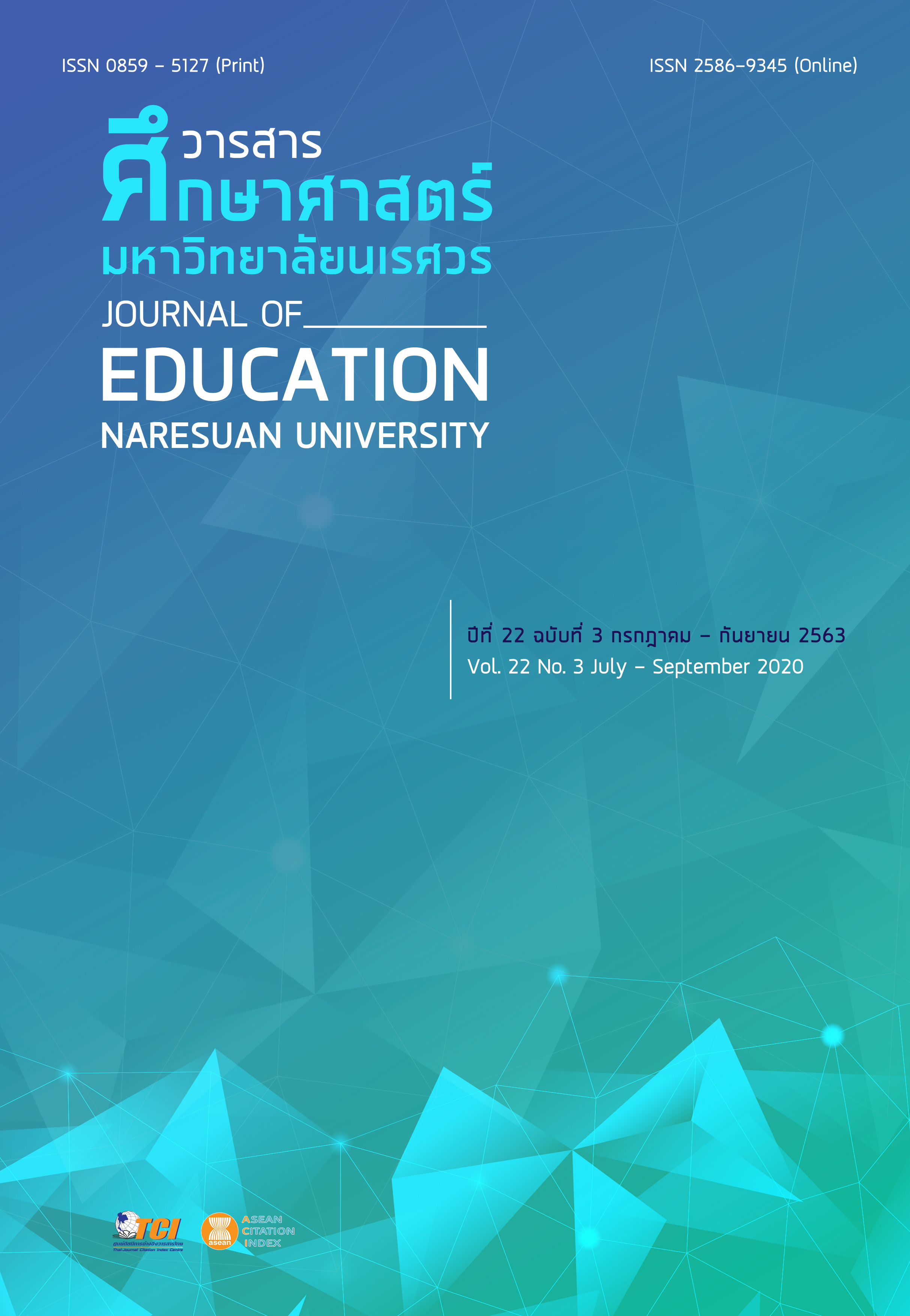THE APPLICATION OF ECONOMIC LITERACY IN THE ECONOMICS CURRICULUM OF THAI BASIC EDUCATION การประยุกต์แนวคิดการรู้ทางเศรษฐกิจในหลักสูตรเศรษฐศาสตร์ ในระดับการศึกษาขั้นพื้นฐานของประเทศไทย
Main Article Content
Abstract
Economic Literacy is one of the disciplinary concepts becoming popular because of the twenty-first century skills concept. The main purpose of this article is to present the definition and scope of economic literacy accompanied by the application of economic literacy in Thai classroom. The present curriculum, the Basic Education Core Curriculum B.E. 2551 (A.D. 2008), can be easily included economic literacy seeing that the concept of standards-based curriculum is compatible with the literacy idea. Also, indicators in the curriculum also reflect the behaviours which students should be showed towards each concept. Using economic literacy enhances experiential learning and decision making through various ways of teaching such as case-based learning, problem-based learning and role playing. As a final, the economic literate citizenship, which is the goal of economic literacy, can be cultivated among students.
Article Details
The owner of the article does not copy or violate any of its copyright. If any copyright infringement occurs or prosecution, in any case, the Editorial Board is not involved in all the rights to the owner of the article to be performed.
References
Asaria, C., & Rebeck, K. (2012). Measurement technique of student performance and literacy: College and high school. In Hoyt, G. M. & McGoldrick, K. (Eds.) International handbook on teaching and learning economics. Cheltenham: Edward Elgar.
Bae, J. (2009). Internet-enhanced Seven-Jump Problem-based Learning: Promoting creativity, economic literacy, and argumentation skills. Other PBL Series, 145.
Baildon, M., & Damico, J. S. (2011). Social studies as new literacies in a global society: Relational cosmopolitanism in the classroom. Routledge.
Buckles, S. (1991). Guidelines for economic content in school programs. In Walstad, W, B., & Soper, J. C. Effective economic education in the school. The Joint Coucil on Economic Education and The National Education Association.
Chytilova, H. (2018). Economic literacy and money Illusion: An experimental perspective. Routledge.
Issarangkul Na Ayutthaya, W., & Anuntavorasakul, A. (2011). Seminar on social studies education: lower-secondary level. Bangkok: Faculty of Education, Chulalongkorn University. [in Thai]
Jantra, K. (2018). Geo-Literacy learning for our planet. Bangkok: Chulalongkorn University Press. [in Thai]
Johnson, A. (2010). Making connections in elementary and middle school social studies (2nd ed.). Los Angeles: Sage.
Khemmani, T. (2010). Science of teaching: Key concepts for effective design in teaching and learning. Bangkok: Chulalongkorn University Press. [in Thai]
Laney, J. D., & Willerson, A. (2016). Teaching economic literacy and justice. In Henning, M. B. Innovations in economic education: Promising practices for teachers and students, K–16. Taylor & Francis.
Levstik, L., & Tyson, C. (2010). Handbook of research in social studies education [electronic resource]. New York: Routledge.
Lietz, P., & Kotte, D. (2000). The importance of economic literacy. Peter Lang Pub.
Mankiw, N. (2008). Principles of economics (5th ed.). Mason, OH: Thomson/South-Western.
Mlller, S. (1991). The case for economics education in the school curriculum. In Walstad, W. B., Soper, J. C. (Eds). Effective economic education in the school. The Joint Council on Economic Education and The National Education Association.
Ministry of Education. (2008). Basic education core curriculum B.E. 2551 (A.D. 2008). Bangkok: Ministry of Education. [in Thai]
Ministry of Education and Training. (2018). New Civic Education Curriculum A.D. 2018. Hanoi: Ministry of Education and Training. [in Vietnamese]
Peterson, J. (2013). Economics Education after the Crisis: Pluralism, History, and Institutions. Journal of Economic Issues, 47(2), 401–410. doi:10.2753/jei0021-3624470213
Pianjud, D. (2008). The development of a web-based instructional model using collaborative and case-based learning for a Thai subject to develop the value of reasonableness in the sufficiency economy philosophy for grade seven students (Master thesis). Bangkok: Chulalongkorn University. [in Thai]
Remmele, B., & Seeber, G. (2012). Integrative economic education to combine citizenship education and financial literacy. Citizenship, Social and Economics Education, 11(3), 189-201.
Sangwanglao, J. (2018). A Comparative study of curriculum content of economics education in Thailand and Australia (Master thesis). Pokfulam: The University of Hong Kong.
Saunders, P. (1994). Global framework for teaching economics. In Walstad, W. An international perspectives on economics education. Kluwer Academic Publishers.
Schiro, M. (2013). Curriculum theory: Conflicting visions and enduring concerns (2nd ed.). Thousand Oaks, Calif.: Sage Publications.
Simachokedee, W. (1999). The effective learning through case study research. Rungsit Business Review, 2, 81-84. [in Thai]
Stamber, L. G. (2013). Economic literacy: Literacy for the digital age to teach in the K-12 Classroom. Retrieved From https://pier.macmillan.yale.edu/sites/default/files/files/Global%20Youth%20in%20the%20Digital%20Age/13_%20ECONOMIC%20LITERACY.pdf
Taweekunnatham, W. (2006). Problem-based activities. In Panich, W. (Eds.) Selected articles for social studies educators. Bangkok: Faculty of Education, Chulalongkorn University. [in Thai]
Walstad, W, B., & Soper, J. C. (1991). Effective economic education in the school. The Joint Coucil on Economic Education and The National Education Association.


